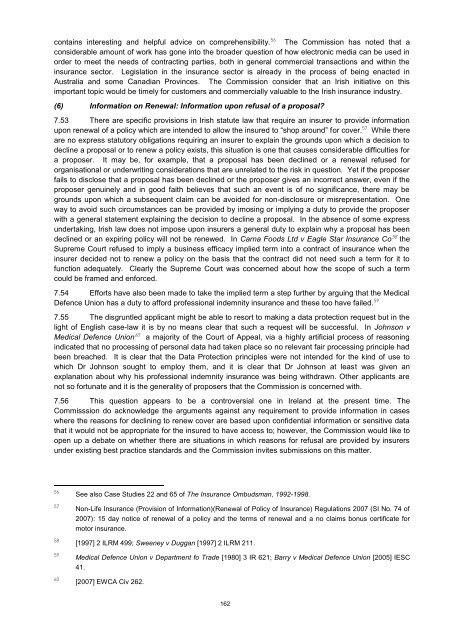Insurance Contracts CP - Law Reform Commission
Insurance Contracts CP - Law Reform Commission
Insurance Contracts CP - Law Reform Commission
You also want an ePaper? Increase the reach of your titles
YUMPU automatically turns print PDFs into web optimized ePapers that Google loves.
contains interesting and helpful advice on comprehensibility. 56 The <strong>Commission</strong> has noted that a<br />
considerable amount of work has gone into the broader question of how electronic media can be used in<br />
order to meet the needs of contracting parties, both in general commercial transactions and within the<br />
insurance sector. Legislation in the insurance sector is already in the process of being enacted in<br />
Australia and some Canadian Provinces. The <strong>Commission</strong> consider that an Irish initiative on this<br />
important topic would be timely for customers and commercially valuable to the Irish insurance industry.<br />
(6) Information on Renewal: Information upon refusal of a proposal?<br />
7.53 There are specific provisions in Irish statute law that require an insurer to provide information<br />
upon renewal of a policy which are intended to allow the insured to ―shop around‖ for cover. 57 While there<br />
are no express statutory obligations requiring an insurer to explain the grounds upon which a decision to<br />
decline a proposal or to renew a policy exists, this situation is one that causes considerable difficulties for<br />
a proposer. It may be, for example, that a proposal has been declined or a renewal refused for<br />
organisational or underwriting considerations that are unrelated to the risk in question. Yet if the proposer<br />
fails to disclose that a proposal has been declined or the proposer gives an incorrect answer, even if the<br />
proposer genuinely and in good faith believes that such an event is of no significance, there may be<br />
grounds upon which a subsequent claim can be avoided for non-disclosure or misrepresentation. One<br />
way to avoid such circumstances can be provided by imosing or implying a duty to provide the proposer<br />
with a general statement explaining the decision to decline a proposal. In the absence of some express<br />
undertaking, Irish law does not impose upon insurers a general duty to explain why a proposal has been<br />
declined or an expiring policy will not be renewed. In Carna Foods Ltd v Eagle Star <strong>Insurance</strong> Co 58 the<br />
Supreme Court refused to imply a business efficacy implied term into a contract of insurance when the<br />
insurer decided not to renew a policy on the basis that the contract did not need such a term for it to<br />
function adequately. Clearly the Supreme Court was concerned about how the scope of such a term<br />
could be framed and enforced.<br />
7.54 Efforts have also been made to take the implied term a step further by arguing that the Medical<br />
Defence Union has a duty to afford professional indemnity insurance and these too have failed. 59<br />
7.55 The disgruntled applicant might be able to resort to making a data protection request but in the<br />
light of English case-law it is by no means clear that such a request will be successful. In Johnson v<br />
Medical Defence Union 60 a majority of the Court of Appeal, via a highly artificial process of reasoning<br />
indicated that no processing of personal data had taken place so no relevant fair processing principle had<br />
been breached. It is clear that the Data Protection principles were not intended for the kind of use to<br />
which Dr Johnson sought to employ them, and it is clear that Dr Johnson at least was given an<br />
explanation about why his professional indemnity insurance was being withdrawn. Other applicants are<br />
not so fortunate and it is the generality of proposers that the <strong>Commission</strong> is concerned with.<br />
7.56 This question appears to be a controversial one in Ireland at the present time. The<br />
Commisssion do acknowledge the arguments against any requirement to provide information in cases<br />
where the reasons for declining to renew cover are based upon confidential information or sensitive data<br />
that it would not be appropriate for the insured to have access to; however, the <strong>Commission</strong> would like to<br />
open up a debate on whether there are situations in which reasons for refusal are provided by insurers<br />
under existing best practice standards and the <strong>Commission</strong> invites submissions on this matter.<br />
56<br />
57<br />
58<br />
59<br />
60<br />
See also Case Studies 22 and 65 of The <strong>Insurance</strong> Ombudsman, 1992-1998.<br />
Non-Life <strong>Insurance</strong> (Provision of Information)(Renewal of Policy of <strong>Insurance</strong>) Regulations 2007 (SI No. 74 of<br />
2007): 15 day notice of renewal of a policy and the terms of renewal and a no claims bonus certificate for<br />
motor insurance.<br />
[1997] 2 ILRM 499; Sweeney v Duggan [1997] 2 ILRM 211.<br />
Medical Defence Union v Department fo Trade [1980] 3 IR 621; Barry v Medical Defence Union [2005] IESC<br />
41.<br />
[2007] EWCA Civ 262.<br />
162

















